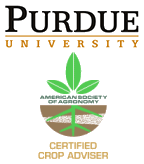
Proceedings 2006
Indiana Certified Crop Adviser Conference
IPM Is a Strategy that Will Sustain Pesticide Technology as a Viable Tool for Managing Risk
All farming systems use pesticides because they are effective against a diversity of pests, fast acting, useful in emergencies, and have a very low cost to benefit ratio. The difference between farming practices considered sustainable, such as certified organic production, and conventional practices, is more the kinds of pesticides allowed than use or no use of pesticides. However, whether any particular pesticide remains a viable, effective tool long into the future depends on overcoming limitations observed even before the advent of DDT. These limitations include destruction of insect natural enemies, rapid evolution of pest resistance, prolonged presence of residues beyond a growing season, and uncertainties over health effects. Many of these limitations are being overcome with the introduction of reduced risk pesticides. However, these new pesticides will only remain effective when used as part of a comprehensive integrated pest management (IPM) program that serves as decision support strategy. Following the principles of IPM, growers can use the new pesticides to achieve better integration of biological and chemical control techniques, thereby assuring long term capabilities for adequately controlling pests.

Washington State University
afelsot@tricity.wsu.edu
http://feql.wsu.edu/index.htm
Dr. Allan Felsot is currently a Professor in the Department of Entomology at Washington State University. He holds a joint research, teaching, and extension service appointment as a specialist in environmental chemistry and toxicology. He is presently stationed at the WSU Food and Environmental Quality Lab in Richland, WA. He obtained a B.S. in biology from Tulane University (1972), an M.S. in Entomology (Insect Physiology) from the University of Florida (1974), and a Ph.D. in Entomology (Pesticide Chemistry) from Iowa State University (1978). Prior to employment at WSU, he was a project leader for pesticide chemistry and toxicology research in the Illinois Natural History Survey at the University of Illinois. He is currently a member of the Advisory Committee for Crop Protection Chemistry of the International Union of Pure and Applied Chemistry (IUPAC) and is past Chair of the American Chemical Society’s Division of Agrochemicals. He is also a member of the Washington State Pesticide Incident Reporting and Tracking Panel (PIRT) and holds the public toxicologist position on the WSDA Pesticide Advisory Board. He currently holds an appointment to the editorial board of the Journal of Environmental Science and Health Part B. During 1992, he held a Fulbright Scholar Award appointment at the Agricultural Research Institute in Nicosia, Cyprus. He has participated in Agency for International Development projects in Bamako, Mali where he set up an analytical laboratory for a government agency and in Amman, Jordan where he taught a workshop on laboratory quality control and assurance. Dr. Felsot’s research and extension interests include hazard assessments of transgenic crops, pesticide drift, sprayer technology assessment, enhanced biodegradation of pesticides, remediation of pesticide waste in soil, best management practices for controlling agrochemical movement to surface and ground water, analytical chemistry of pesticide residues, pesticide toxicology, regulations, pesticide applicator training, and risk communication. He teaches the graduate courses “Fundamentals of Environmental Toxicology,” “Applied Environmental Toxicology,” and “Comparative Physiology.” He team teaches the graduate course, “Pesticides: Toxicology and Modes of Action.” Dr. Felsot also teaches the undergraduate service course, Agricultural Entomology. Dr. Felsot is the recipient of the 2001 WSU College of Agriculture Award for Excellence in Extension and the 1999 North Star Award from the Western Crop Protection Association. He is also an honorary member of the WA State Weed Association. A partial list of Dr. Felsot’s scientific journal articles, book chapters, and essays can be found at the website of WSU’s Food and Environmental Quality Lab (http://feql.wsu.edu).